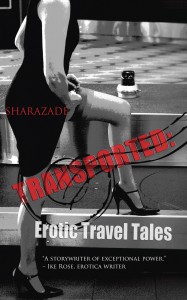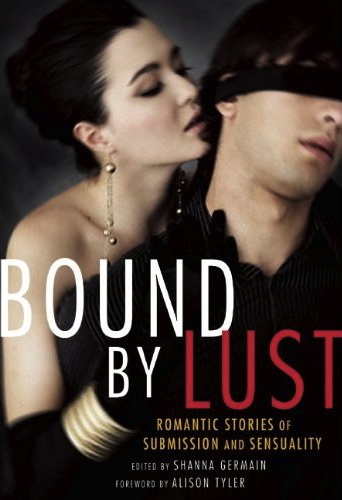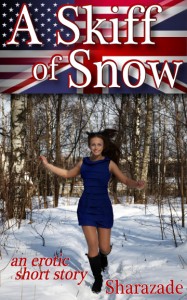Around Christmastime last year, I read and reviewed Best Bondage Erotica. Also around that time, I was listening (as I always do at that time) to the Mozart Requiem — which, okay, I know is not exactly Christmas music, but its sound fits December better than it does the Easter season, for me — and I was thinking about its controversial last section, the Lux aeterna, and reading that book… and so I particularly noticed the name of one author, Lux Zakari (which you could sing to the Requiem music, if you tried).
So when I had the chance to interview that very author, of course I jumped at it. She has a new novel that is just out (complete with music! really!), and has already published a number of short stories as well as another novel. So I asked her about writing, and the difference between short stories and novels, and her new book, and of course her name. For those who like to skip ahead, the dirty bits (a hot excerpt) are down there at the bottom. *wink*
Shar: I love your name! Is there a story behind it?
Lux: Thank you—and there is! But the truth is actually very uncool. Without getting into the details, I’ll just confess that similar to deriving one’s porn star name, I invented a new pen name formula: name of an intriguing female character in literature + the mispronounced name of the foxiest guy you’ve ever seen in your life (i.e., my last name is pronounced Za-KAR-ee, not like Zachary).
Shar: I figured that’s how Zakari was pronounced, because otherwise it won’t fit to the Mozart. So, you’ve published one novel, are on the verge of releasing a new one, and have published a dozen or more short stories. I’m in awe of novelists. What, for you, are some differences between writing a novel and writing a short story? Do you always know in advance whether an idea will go long or short?
Lux: I definitely notice a difference between my short stories and my novels. My novels tend to have more dialogue and a sense of humor, while my short stories – as most short stories do – focus on one pivotal scene, usually of a sexual nature. Short stories let me test the waters, explore an idea I know couldn’t be blown up into a full-length novel. They also give me a chance to reach a wider audience; someone picking up Best Bondage Erotica 2011 may never have heard of me otherwise.
Shar: As the was case for me! So yay for that book. Now, as you sit down to type out Chapter 1 of a novel, do you have most of the plot elements already mapped out, or are you venturing out into the unknown?
Lux: Chapter one is too scary, too overwhelming! I usually don’t start there. Instead, I bang out whatever scene is most well developed in my head; that usually ensures that I’m writing at least something. Sometimes I’ll even write the ending before the beginning. It’s fun – albeit sort of challenging – to go back later and think of ways to link all the pieces together.
But usually, I do write with a synopsis planned out; it helps give me direction and focus but does leave some room for surprises. However, one year I started writing a novel with nothing more than a list of things I thought would be funny or cool to have in a story, and with zero expectations, I just went for it, and it turned into something I’m incredibly proud of. It needs a lot of editing, perhaps even a major overhaul, but I hope to someday have something come of it.
Shar: OK, now I want to read that one! So remember to let me know when it’s finished. I admit that I had never thought of not starting a novel with Chapter 1. I’m always curious about how other writers go through “the process.” Once a short story or novel is finished, how much (if at all) do you change things like plot or characters’ personality? Or is the editing you do pretty much only for grammar and word choice?
Lux: I read through the story again to get the overall picture – which is key, since I’d been writing out of order all along! – and I try to discern what’s working and what isn’t. I try to be honest with myself in terms of that and trust my gut, even if that means cutting something I love.
Shar: Now, when you write short stories, are they generally tailored for a specific publication or website, or do you write what you feel like writing, and then later look around to see if there’s a suitable place to publish them?
Lux: I do the latter – write it then look. For me, that makes sense; otherwise, if the story doesn’t get picked up, I’m stuck with a story tailored only for one specific publication. However, I often run into the problem where my word count is nowhere near the specified range! There’s a bright and dark side to everything.
Shar: So tell us about the new one! Could we have a brief description of Finale, and maybe some information about how the idea came to you, or why you decided to write this story?
Lux: The inspiration for Finale may strike some readers as obvious, but it goes beyond the bare-bones concept of a music legend dying under sudden circumstances and leaving his three children behind. This isn’t the music legend’s story. I wanted to explore the idea of what the aftermath of his death would be like for all the parties involved, and I wanted to intersperse the story with a complicated love story providing evidence behind the decision to leave the children under the guardianship of a person who never thought of anyone but herself.
And now, the official blurb:
When music legend Jonathan Levant dies in a motorcycle accident, no one is more stunned than his former lover Olivia Gray, a hedonistic ex-celebrity who learns she’s been inexplicably named the guardian of his children. Olivia’s reluctant acceptance of the new parental role obliterates her hope of resurrecting her songwriting career as she faces sarcastic teenagers, suicide attempts, and séances. The upset to her self-indulgent life forces Olivia to finally face the truth about the cruel decisions of her wild past, her now uncertain future and her secret, turbulent relationship with a man who, even in death, continues to upend her world.
Shar: You noted in an email to me that you’re working on a soundtrack for the story. Tell us about that! Will this be available somehow to readers?
Lux: It will! Music features very heavily in the story, and as a dabbling songwriter, I interspersed lyrics I’d written throughout Finale. Then I approached my talented musician friend Paul, about creating a soundtrack for the story, and he’s been working on writing the music to the tracks. We are still in the midst of the recording process, but I hope to have the music posted on YouTube and available for free via iTunes. I’m very excited about this and can’t wait for everyone to hear the project!
Shar: How about a short excerpt from the new novel? Either something that shows the tone or writing style of the book, or — heh heh — one of the “naughty bits”?
Lux: It would be an honor!
* * * * *
Like it’d been my intent all along, I circled the piano, stood in front of the wine and casually refilled my cup. I was all too aware of Jonathan standing far too close on my left. I’d no sooner taken a sip when he asked, “Am I making you nervous?”
I spun around, my back against the piano and my heart pounding. “Why would you say that, Mr. Levant?”
“Ah, answering a question with a question—a sure sign of nerves.” He gave me a rakish grin and took a step closer to me, an act that made my mouth dry. “You know, before it was always ‘kiddo’ or a sarcastic ‘Johnnie.’” He placed his palms on the piano, trapping me in from all sides as he leaned toward me, unapologetically self-assured and sexy. “Now I’m Mr. Levant. What’s changed?”
“Absolutely nothing.” Faced with the inevitable and desperate for control, I closed the paltry distance between us, pressing my lips against his. Plusher than I’d remembered. He groaned softly but responded accordingly in a way that made my mind cloud with want.
We slid to the floor, trading open-mouthed, end-of-the-world kisses. My eyes rolled to the back of my head as his fingers slid beneath my shirt to cup my breast, plucking my sensitive nipples to life. His tongue licked a path down my throat, and my breath hitched at the expertise of his touch and the surprising reaction it evoked in me.
This was not the Jonathan Levant I knew, yet it was, a reminder that further triggered my arousal.
“Isn’t this the part where you push me away?” he murmured in my ear as he tore the shirt from my body with an urgency that excited me. “Aren’t you supposed to make a dramatic exit after yelling at me for taking advantage of you?”
I couldn’t believe he wanted to trade quips at such a time like this, let alone had the ability to do so. I shook the fog of desire from my head and forced myself to be Olivia again—the Olivia capable of rational thought who did not allow good-looking boys to dictate her emotions for better or worse. “Who says I’m the one being taken advantage of?” I asked, reaching between us to give his cock, still confined in his pants, a pointed squeeze.
“All right.” His body trembled with a shudder of pleasure, but he covered my hand with his and rolled us over so I was pinned to the floor, his body wedged between my open legs. “Have your way with me then.”
“That would sound more believable if you were on the bottom.” I was proud of myself for regaining a bit of self-control, but that small amount vanished once again when Jonathan reared back and tugged down my pants, taking my panties with them.
* * * * *
OK, that worked for me! 😉 Purchase Finale here, her previous novel Coercion here, and be sure to check out Lux Zakari’s website here.
* * * * *
















